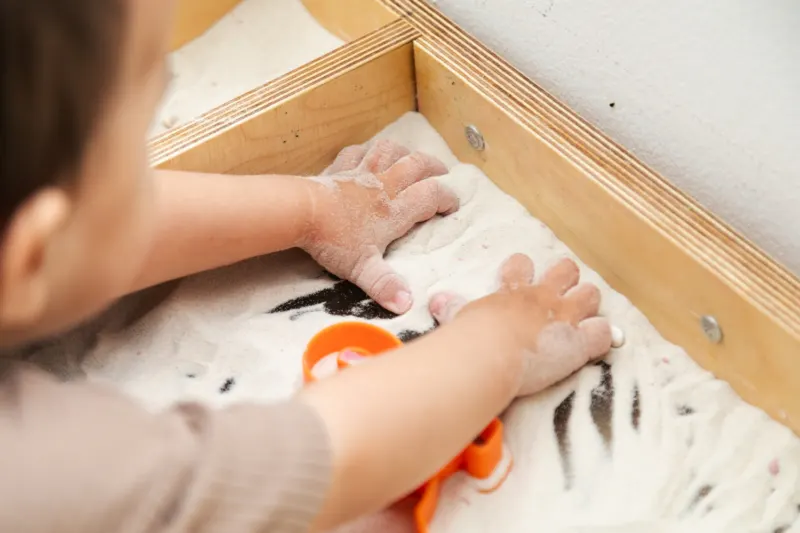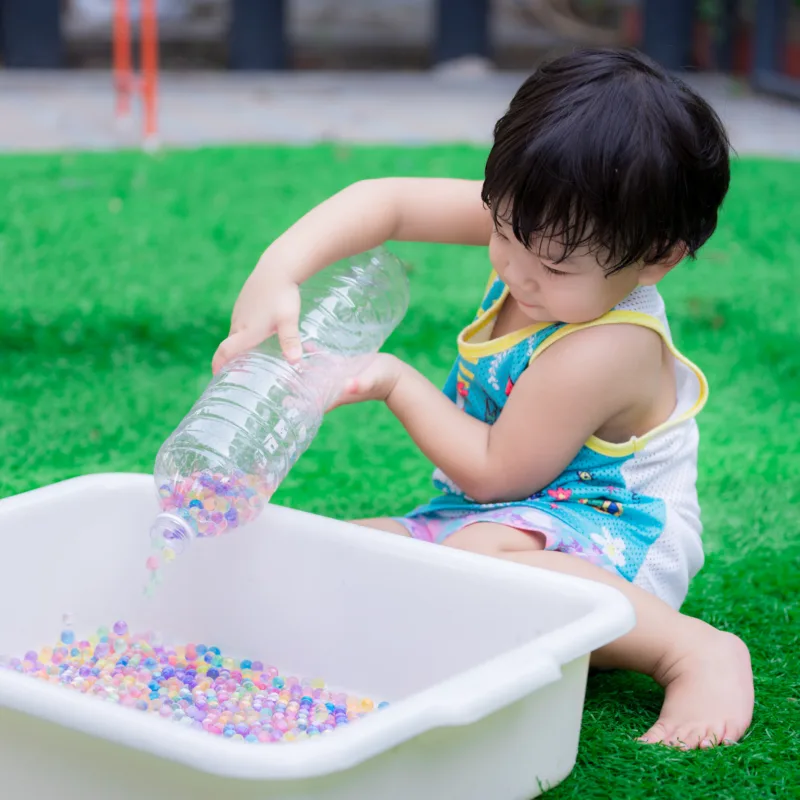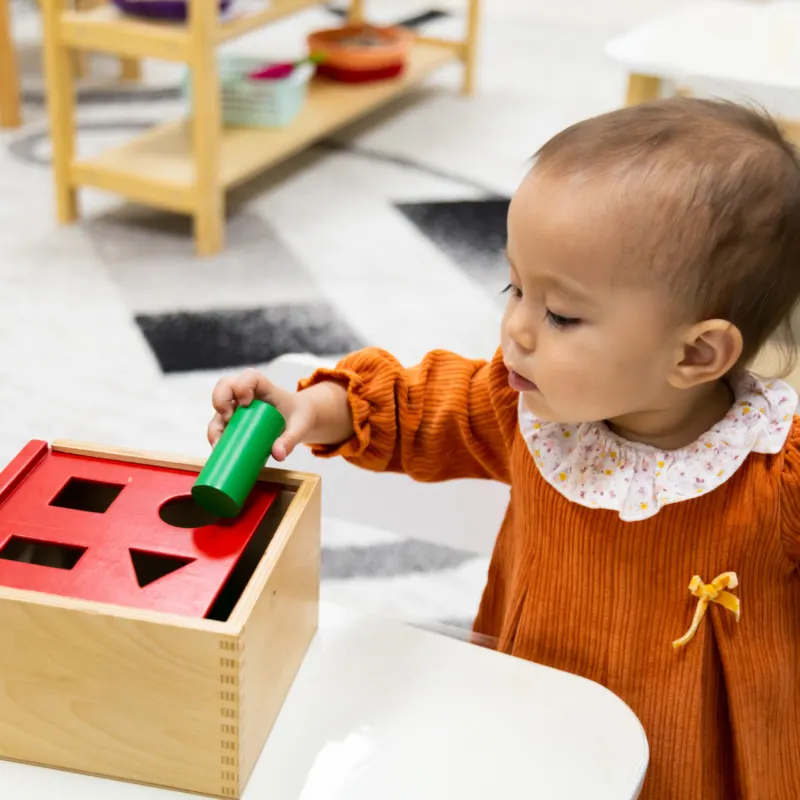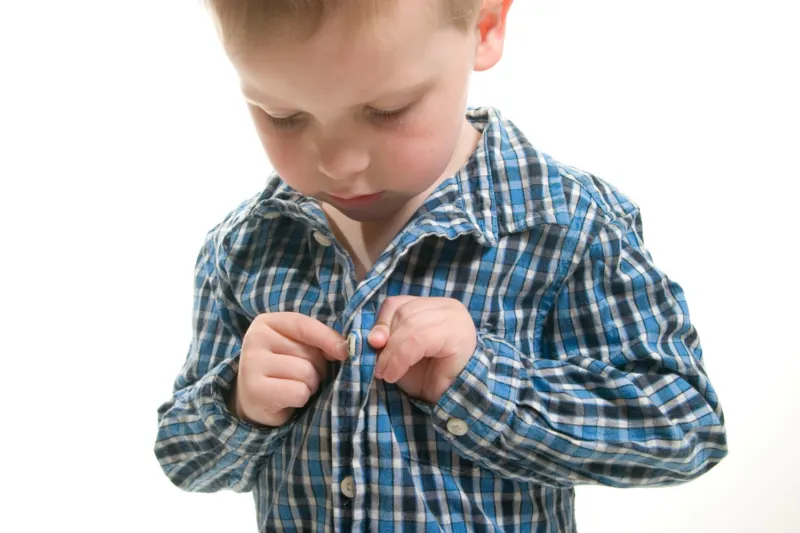Are you searching for stimulating activities to engage your 18-month-old? Look no further. In this post, we dive into the Montessori approach and uncover a range of engaging activities that are perfect for your child’s development.
The Montessori method, developed by Dr. Maria Montessori, emphasizes the importance of hands-on learning and independence. By providing age-appropriate activities, children are encouraged to explore and discover their interests at their own pace.
In this post, we have curated a collection of engaging Montessori-inspired activities specifically designed for 18-month-olds. From practical life skills like pouring and sorting objects to sensory experiences and fine motor activities, these ideas will not only keep your child entertained but also foster important developmental skills.
Join us as we explore the Montessori approach and provide you with a selection of engaging activities that will engage, entertain, and educate your 18-month-old. Get ready to embark on a journey of learning and discovery!

What is the Montessori Approach?
The Montessori approach is an educational philosophy developed by Dr. Maria Montessori. It is based on the belief that children are naturally curious and capable of independent learning. The Montessori method focuses on creating an environment that promotes exploration, discovery, and hands-on learning.
In a Montessori classroom, children have the freedom to choose their own activities and work at their own pace. The teacher acts as a guide, providing support and encouragement when needed. This approach encourages children to become independent thinkers and problem solvers.
The Montessori approach is not limited to the classroom. It can be applied at home as well, creating an environment that fosters independence and self-discovery. By incorporating Montessori principles into your daily routine, you can provide your 18-month-old with a rich learning experience that promotes their overall development.

Benefits of the Montessori Approach for 18-month-olds
The Montessori approach offers numerous benefits for 18-month-olds. At this age, children are rapidly developing their cognitive, language, and motor skills. The Montessori method provides them with the tools and opportunities to explore and develop these skills in a natural and engaging way.
One of the key benefits of the Montessori approach is that it promotes independence. By allowing children to choose their own activities and work at their own pace, they develop a sense of autonomy and self-confidence. This independence extends to their daily activities as well, as they learn to dress themselves, feed themselves, and take care of their own needs.
Another advantage of the Montessori approach is that it promotes a love for learning. By creating an environment that is rich in stimulating activities and materials, children are naturally drawn to explore and discover. This love for learning sets the foundation for a lifetime of curiosity and intellectual growth.
Additionally, the Montessori approach fosters important social and emotional skills. Through group activities and interaction with their peers, children learn to cooperate, share, and communicate effectively. They develop empathy and respect for others, laying the groundwork for healthy relationships later in life.

Understanding the Developmental Needs of 18-month-olds
Before we delve into the Montessori-inspired activities, it is important to understand the developmental needs of 18-month-olds. At this age, children are rapidly developing their language and communication skills. They are starting to form words and understand simple instructions.
Fine motor skills are also developing rapidly. Children are learning to use their fingers and hands to grasp objects, manipulate small objects, and engage in activities that require hand-eye coordination.
Cognitive development is another key area of focus. At 18 months, children are beginning to understand cause and effect, problem-solving, and abstract thinking. They are curious about their surroundings and eager to explore.
Lastly, sensory exploration plays a crucial role in the development of 18-month-olds. They are fascinated by different textures, sounds, and smells. Engaging their senses through various activities helps them make sense of the world around them.
By keeping these developmental needs in mind, we can create activities that are not only engaging but also provide the right level of challenge and stimulation for your 18-month-old.

Montessori-Inspired Activities for Language Development
Language development is a crucial aspect of your child’s overall growth. By providing them with opportunities to explore and engage in language-rich activities, you can help them develop their vocabulary, comprehension, and communication skills.
- Storytime with props: Choose a favorite storybook and gather props that represent key elements of the story. As you read the book, encourage your child to interact with the props, making connections between the objects and the words in the story.
- Sound matching: Create a set of cards with pictures of objects that make different sounds, such as a bell, a drum, and a whistle. Play the sounds and ask your child to match the sound to the corresponding picture.
- Labeling objects: Label objects around the house with simple words or pictures. Encourage your child to find the objects and say their names. This activity helps develop their vocabulary and word recognition skills.
These language activities provide a fun and interactive way for your child to develop their language skills while engaging their imagination and creativity.

Montessori-inspired activities for fine motor skills development
Fine motor skills are essential for a child’s overall development, as they enable them to perform everyday tasks and engage in activities that require precision and coordination. Montessori-inspired activities can help strengthen these skills in a fun and engaging way.
- Pouring and transferring: Set up a pouring station with different containers and a small pitcher of water. Encourage your child to pour water from one container to another, developing their hand-eye coordination and pouring skills.
- Threading beads: Provide your child with a string and a set of large beads. Demonstrate how to thread the beads onto the string and let them practice on their own. This activity helps improve their hand dexterity and concentration.
- Pom-pom transfer: Use a pair of child-sized tongs and a set of colorful pom-poms. Show your child how to use the tongs to pick up the pom-poms and transfer them to different containers. This activity enhances their hand strength and coordination.
These fine motor activities not only develop your child’s hand and finger muscles but also improve their hand-eye coordination and concentration.

Montessori-inspired activities for cognitive development
Cognitive development is a crucial aspect of your child’s overall growth. Montessori-inspired activities can help stimulate their thinking, problem-solving, and memory skills.
- Matching games: Create a set of matching cards with pictures of familiar objects or animals. Spread the cards out and encourage your child to find the matching pairs. This activity improves their memory and visual discrimination skills.
- Shape sorting: Provide your child with a set of different shapes and a corresponding sorting tray. Demonstrate how to match each shape to its corresponding slot and let them practice on their own. This activity develops their shape recognition and problem-solving skills.
- Stacking blocks: Offer your child a set of blocks of different sizes. Encourage them to stack the blocks in various ways, promoting their spatial awareness and problem-solving abilities.
By engaging in these cognitive activities, your child will develop important thinking skills that will benefit them throughout their lives.

Montessori-Inspired Activities for Sensory Exploration
Sensory exploration plays a vital role in your child’s development as it helps them make sense of the world around them. Montessori-inspired sensory activities can engage their senses and provide a rich learning experience.
- Sensory bins: Fill a plastic bin with various sensory materials like rice, sand, or water beads. Provide your child with different tools and objects to explore the sensory materials, such as spoons, cups, and small toys. This activity engages their senses of touch and sight.
- Texture scavenger hunt: Create a scavenger hunt using different textured objects around the house. Encourage your child to find objects that are rough, smooth, soft, or bumpy. This activity stimulates their sense of touch and promotes tactile discrimination.
- Scented playdough: Make scented playdough using natural ingredients like essential oils or herbs. Let your child explore the playdough using their hands and engage their sense of smell.
These sensory activities provide a rich sensory experience that stimulates your child’s senses and promotes their cognitive and emotional development.
Incorporating Practical Life Skills in Daily Activities
The Montessori approach emphasizes the importance of practical life skills in a child’s overall development. By involving your child in daily activities, you can help them develop independence, concentration, and a sense of responsibility.
- Dressing themselves: Encourage your child to dress themselves by providing them with clothes that are easy to put on and take off. Start with simple tasks like putting on socks or buttoning a shirt and gradually increase the difficulty level as they become more confident.
- Mealtime preparation: Involve your child in mealtime preparation by allowing them to help with simple tasks like washing fruits and vegetables, setting the table, or stirring ingredients. This activity promotes their fine motor skills and teaches them about healthy eating habits.
- Cleaning up: Teach your child how to clean up after themselves by providing them with child-sized cleaning tools like a small broom and dustpan. Encourage them to tidy up their toys or wipe down surfaces. This activity instills a sense of responsibility and teaches them the importance of taking care of their environment.
By incorporating practical life skills into your daily routine, you are not only helping your child develop important life skills but also fostering their independence and self-confidence.

Montessori-inspired Toys and Materials for 18-month-olds
In addition to engaging activities, Montessori-inspired toys and materials can further enhance your child’s learning experience. Here are some recommendations for toys and materials that are suitable for 18-month-olds.
- Stacking and nesting toys: These toys help develop hand-eye coordination and problem-solving skills. Look for toys that come in different sizes and can be stacked or nested together.
- Puzzles: Simple puzzles with large pieces are ideal for 18-month-olds. They help improve fine motor skills, hand-eye coordination, and problem-solving abilities.
- Open-ended toys: Open-ended toys like wooden blocks or play scarves promote creativity, imagination, and problem-solving skills. They allow your child to explore and discover different ways to play.
- Sensory materials: Provide your child with a variety of sensory materials like playdough, textured balls, or fabric swatches. These materials engage their senses and promote sensory exploration.
When choosing toys and materials for your 18-month-old, look for those that are safe, age-appropriate, and encourage open-ended play.

The Montessori approach offers a wealth of engaging activities that can foster your 18-month-old’s overall development. By providing age-appropriate activities that promote independence, hands-on learning, and sensory exploration, you can create a stimulating environment that nurtures their curiosity and love for learning.
From language development to fine motor skills, cognitive development, and sensory exploration, the Montessori-inspired activities outlined in this article provide a holistic approach to your child’s growth. By incorporating practical life skills into their daily routine and providing them with Montessori-inspired toys and materials, you can further enhance their learning experience.
Remember, the journey of learning and discovery starts with you. Embrace the Montessori approach and watch your 18-month-old thrive as they engage, entertain, and educate themselves through these stimulating activities.

